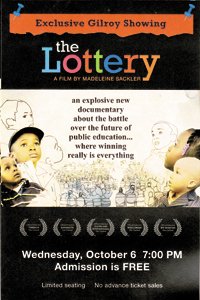”
The Lottery,
”
a film detailing the difference a zip code can make on a child’s
educational options, opened in major cities across the nation this
summer. Thanks to the efforts of a group of local charter school
organizers, the documentary will make its Gilroy debut Wednesday,
the night before the school board debates the merits of said
charter school.
“The Lottery,” a film detailing the difference a zip code can make on a child’s educational options, opened in major cities across the nation this summer. Thanks to the efforts of a group of local charter school organizers, the documentary will make its Gilroy debut Wednesday, the night before the school board debates the merits of said charter school.
The timing is no coincidence.
“The hope is to get administrators, parents and community members there just to start the conversation,” said Sharon Waller, a veteran teacher and driving force behind Gilroy Prep School, the kindergarten through eighth grade charter school she and her colleagues hope to open with grades K through second in time for next school year.
“The purpose is to inform the community about charter schools,” Waller said. “It’s a movement that’s not going away. We’re hoping (the film screening) will foster a lively discussion the next night.”
The film tells the stories of four families in the months leading up to “the lottery.” But instead of riches, these families were holding their breath for a coveted spot in Harlem Success Academy, an inner-city charter school that churns out successful students by the hundreds while its public school counterparts are flailing.
First-time filmmaker Madeleine Sackler said she was fascinated by the scene that played out at the Harlem Armory in the spring of 2008, when 5,000 families packed in to learn their children’s fate, decided in a split second by a random lottery.
“Where you’re born is already a lottery so going to a great school shouldn’t be,” Sackler said Wednesday in a phone interview.
Born in Connecticut, Sackler grew up 30 minutes from the Harlem schools she documented in “The Lottery.”
“I was lucky enough to go through a good public school system,” she said.
But because of where they lived, the subjects of her film were not.
“That’s just it,” she said. “It’s really illogical. It’s a moral incongruity, and whatever way you slice it, we need to be doing something.”
Widespread media attention, celebrity endorsements and a series of films detailing the flaws of the public education system have sparked spirited public debate around the charter school movement and a public education system many have called “broken.”
That’s exactly what Sackler aimed for with her film.
“It’s a very local issue,” she said. “I want the film to be used to start a conversation. There’s only so much you can do in an 80-minute film.”
Though the situation in Gilroy isn’t nearly as dire or controversial as the one captured in “The Lottery,” the need for a charter school in any community “comes from the same longing parents have for excellent schools,” Waller said. “They want more options.”
Steve Staloch, a member of Gilroy Prep’s governing board and publisher of the Gilroy Dispatch, agreed.
“The backdrop is Harlem but the premise is the same,” Staloch said. “Parents want a quality education for their children, and we can’t allow a bureaucracy to dictate what that education looks like.”
Without acknowledging several basic tenets, meaningful education reform will not happen, Staloch said.
“The collective education system in this country is broken. Period,” he said. “Options are too few and too restrictive, especially for low-income families. While not all charter schools are successful, they model innovative learning techniques that are comparatively revolutionary and demand a level of teacher and student accountability simply not found in the public school system today.”
When Staloch contacted Sackler about bringing her critically acclaimed documentary to Gilroy, she said she was happy to help.
Unlike the volatile situation in Harlem, which included a political clash between the teachers union and the charter school, the idea of opening a new charter school in Gilroy has been received much more favorably.
“They’re experienced and they know what they’re doing,” said Michelle Nelson, president of the Gilroy Teachers Association, of the charter school’s organizers. “It’s hard for me to be against something when I’ve known the people involved for years.”
As far as academic achievement, Nelson was confident that the charter would succeed. Her concern is the impact the school will have on the district’s public schools and their teachers. Because its target population is Gilroy students, and public schools receive funding on a per student basis, the charter school will pull revenue from Gilroy public schools, Nelson pointed out.
“It does represent a loss,” she said. “That’s a big question mark.”
Nelson planned to watch an early screening of the film Thursday night with Gilroy Prep’s organizers.
School board members also said they were intrigued by the movie and how it would open the conversation about the charter school they will consider the next night.
“I’m looking for as much proof as possible that this charter school can be one of the successful ones,” said trustee Rhoda Bress, who plans to attend Wednesday’s screening. “I am not pro-charter or against charter. I am for high performing schools that serve students well. I don’t think charter schools are panaceas.”
Bress also pointed out the condition of the schools in Gilroy was not comparable to the scene that plays out in Sackler’s film.
“I don’t now if the situation in the movie is comparable to what we have in Gilroy,” she said. “Their (the students in the film) only option is failing schools. I don’t think that’s what we have in Gilroy. But it’s good to see what’s current in charter school issues.”
Still plowing through the 100-page charter school petition, Bress said she would be relying on the expertise of the school district’s staff and the charter’s organizers to answer her questions.
Superintendent Deborah Flores said she was not yet prepared to make a recommendation for or against the charter school.
But whether it’s Harlem or Gilroy, every student should have access to the educational options that put them on a path to success, Sackler said.
“In my mind, parents could care less if the school is charter or public. What’s important is that it’s working for kids,” she said. “Every single parent I talked to understood that education is the key to their kids having a choice, to breaking the cycle of poverty.”














